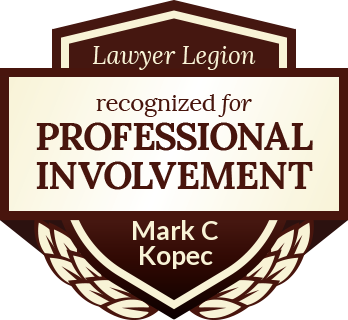Mark Kopec Now
Neurologist
Medical Malpractice with the Baltimore Neurologist Lawyer
Neurologists are medical professionals who specialize in diagnosing and treating disorders of the nervous system. The nervous system generally includes the brain, spinal cord, and peripheral nerves. Neurologists generally play a role in managing a wide range of conditions, from headaches and strokes to neurological diseases like Parkinson’s disease and multiple sclerosis. If you have been injured, then you may have medical malpractice claim and need the Baltimore neurologist lawyer at the Kopec Law Firm.
Education and Training
To become a neurologist, individuals must complete an educational and training process:
- Undergraduate Degree: Firstly, a bachelor’s degree in a field like biology, chemistry, or neuroscience is typically required.
- Medical School: Afterward, completion of a Doctor of Medicine (MD) or Doctor of Osteopathic Medicine (DO) degree is necessary.
- Neurology Residency: Then a three-year residency program focused on neurology provides training in the diagnosis and management of neurological disorders.
- Board Certification: Lastly, many neurologists choose to obtain board certification from the American Board of Neurology & Psychiatry.

Licensing and Board Requirements
Neurologists must be licensed to practice medicine in the state where they work. Licensing requirements vary by state but generally involve passing medical licensing exams and meeting specific education and training standards. Additionally, board certification is often considered a significant credential and can enhance a neurologist’s professional standing.
Types of Patients and Conditions
Neurologists generally see patients of all ages, from infants to the older. They treat a wide range of conditions, including:
- Headaches and Migraines: Diagnosing and managing different types of headaches.
- Stroke: Providing acute care and also rehabilitation for stroke patients.
- Dementia and Alzheimer’s Disease: Assessing and managing cognitive decline.
- Epilepsy: Diagnosing and treating seizures.
- Movement Disorders: Managing conditions like Parkinson’s disease, Huntington’s disease, and dystonia.
- Multiple Sclerosis: Diagnosing and treating this autoimmune disease.
- Neuropathies: Evaluating and treating nerve damage.
- Brain Tumors: Diagnosing and treating both benign and malignant brain tumors.
- Spinal Cord Injuries: Providing care for individuals with spinal cord injuries.
The Baltimore Neurologist Lawyer can review with you the specific condition you have.
Tests and Treatments
Neurologists employ a variety of tests and treatments to diagnose and manage neurological conditions:
- Neurological Examinations: Assessing cognitive function, reflexes, sensory perception, and motor skills.
- Imaging Studies: Using techniques like MRI, CT Scans, and PET scans to visualize the brain and spinal cord.
- Electrophysiological Tests: Measuring electrical activity in the brain and nerves (e.g., EEG, EMG).
- Lumbar Puncture: Collecting cerebrospinal fluid for analysis.
- Medications: Prescribing drugs to treat various neurological conditions, including anticonvulsants, antidepressants, and medications for movement disorders.
- Surgery: Referring patients for surgical procedures when necessary, such as brain tumor removal or deep brain stimulation.
- Rehabilitation: Recommending physical, occupational, and speech therapy to help patients recover from neurological conditions.
Work Environment and Collaboration
Neurologists work in a variety of settings, including hospitals, clinics, and private practices. They often collaborate with doctors and other healthcare professionals, such as:
- Neurosurgeons: Specialists who perform surgical procedures on the nervous system.
- Neuropsychologists: Professionals who assess cognitive function and provide psychological support.
- Physical Therapists: Experts in helping patients improve physical function.
- Occupational Therapists: Professionals who focus on activities of daily living and independence.
- Speech Therapists: Specialists who address communication and swallowing difficulties.
Medical Malpractice & the Baltimore Neurologist Lawyer
Medical malpractice claims against neurologists can arise from a variety of errors, including:
- Misdiagnosis: Incorrectly diagnosing a neurological condition.
- Delayed Diagnosis: Failing to diagnose a condition in a timely manner.
- Incorrect Treatment: Providing inappropriate or ineffective treatment.
- Surgical Errors: Mistakes during surgical procedures.
- Medication Errors: Prescribing incorrect medications or dosages.
Neurologist Subspecialties
Neurology encompasses several subspecialties, each focusing on specific areas of the nervous system:
- Child Neurology: Treating neurological disorders in children and also adolescents.
- Neurocritical Care: Caring for patients with severe neurological conditions in intensive care units.
- Neuroimmunology: Focusing on autoimmune disorders affecting the nervous system.
- Neuro-oncology: Specializing in the diagnosis and also treatment of brain tumors.
- Neuroophthalmology: Dealing with disorders affecting the vision and nervous system.
- Pain Medicine: Managing chronic pain conditions.
- Sleep Medicine: Diagnosing and treating sleep disorders.
- Vascular Neurology: Focusing on disorders of blood vessels in the brain and neck.
Next Step: Call the Baltimore Neurologist Lawyer
Medical malpractice claims involving neurologists can be complex and specifically require a thorough understanding of the specific area of expertise. If you believe you may have a medical malpractice case against a neurologist, then it is essential to consult with an experienced attorney who specializes in medical malpractice law.
Visit the Kopec Law Firm free consultation page or video. Then contact us at 800-604-0704 to speak directly with Attorney Mark Kopec. He is a top-rated Baltimore medical malpractice lawyer. The Kopec Law Firm is in Baltimore and pursues cases throughout Maryland and Washington, D.C.





